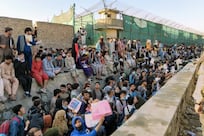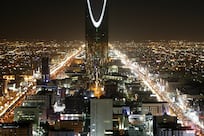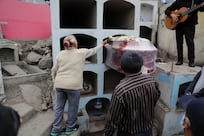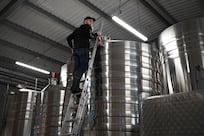One fine spring day early in the pandemic, the peace and unnatural quiet of a suburban street in north London was shattered by Ella Al-Shamahi shouting “Timber-r-r!” at the top of her lungs.
It was not perhaps the backdrop of choice for a paleoanthropologist more accustomed to searching for the remains of ancient civilisations in the jungle, digging for bones in Stone Age caves or studying leopards up close in wildlife reserves.

But, with Al-Shamahi’s usual stomping grounds temporarily off limits, where’s a National Geographic explorer pushed to the end of endurance by the tedium of lockdown to turn to for an adventure if not the garden?
“At one point, I did climb a tree because it was part of a ‘we’ve had enough kind of thing’,” Al-Shamahi, 37, tells The National. “The tree was a bit overbearing and we needed to chop down a few of the branches. There was nothing else to do. I was so bored.”
Al-Shamahi’s London “base camp” is from where she normally sets off to remote locations for the filming of TV programmes watched by millions, such as Jungle Mystery: Lost Kingdoms of the Amazon.

That the producer and presenter felt compelled to find an escapade in the backyard “just to get through” coronavirus restrictions was a source of deep amusement to her somewhat diminished audience of siblings and neighbours.
In non-Covid times, the many perils – the minefields, sheer cliff faces and deep caves, the angry tribes, warlords, drug gangs and pirates – come with the hostile territory for fossil hunters of her ilk.
Part of her motivation is derived from her heritage. Al-Shamahi’s parents moved from Sanaa for her father to study for a master's degree in Birmingham, where the young Ella – or then Aalaa – was constantly told that she looked like her Syrian great-grandmother. “So I kind of felt a kindredness towards that part of me,” she says.
The third of five children, she concedes to being a boisterous child, imbued with a confidence that she has carried into later life judging by her countless exploits.
The list of places where she has worked reads like a departures board in the Foreign Office’s worst nightmare: war and conflict zones and scenes of terrorist activity or political unrest, such as her ancestral homelands of Yemen and Syria, as well as Iraq, Nagorno-Karabakh, South America and the waters off Somalia.
Her predilection for being between prehistoric rock art and a hard place does not, she argues, make her an adrenaline junkie. “It’s really, genuinely not the case,” Al-Shamahi says.
“I am not denying that I get a kick out of having some rather fantastic stories to be able to tell when we’re out at a restaurant or down at the local, but it’s so much more than that.”
What it is all about is science’s geography problem. Some of the biggest discoveries in archaeology are yet to be made in the most unstable regions because they are underexplored and understudied.
“We’ve somehow decided as a scientific community that risk that involves politically unstable places is riskier than other risk,” Al-Shamahi says. “It’s a tragedy for science.
“There are scientists who go into outer space,” she says. “They literally attach themselves to rockets, but those kinds of risks are not deemed to be too unsafe. A lot of us are just asking for the risks of doing science in unstable places to be viewed in the same kind of case-by-case, nuanced way.”
That the producer and presenter felt compelled to find an escapade in the backyard “just to get through” coronavirus restrictions was a source of deep amusement to her somewhat diminished audience of siblings and neighbours.
In non-Covid times, the many perils – the minefields, sheer cliff faces and deep caves, the angry tribes, warlords, drug gangs and pirates – come with the hostile territory for fossil hunters of her ilk.
Part of her motivation is derived from her heritage. Al-Shamahi’s parents moved from Sanaa for her father to study for a master's degree in Birmingham, where the young Ella – or then Aalaa – was constantly told that she looked like her Syrian great-grandmother. “So I kind of felt a kindredness towards that part of me,” she says.
The third of five children, she concedes to being a boisterous child, imbued with a confidence that she has carried into later life judging by her countless exploits.
Diggers without borders
The list of places where she has worked reads like a departures board in the Foreign Office’s worst nightmare: war and conflict zones and scenes of terrorist activity or political unrest, such as her ancestral homelands of Yemen and Syria, as well as Iraq, Nagorno-Karabakh, South America and the waters off Somalia.
It is also, Al-Shamahi argues, a tragedy for those living in the “quite significant portions of the planet” with a blanket ban. How many important discoveries could be made, she asks, if more study was allowed that might also give local experts a prospect for a future in science through collaborations, grants and funding?
“All round, it’s just better if we’re doing responsible science in those places,” she says.
Al-Shamahi has witnessed the profound boost that communities derive from merely knowing that exploration is happening on their doorstep. She talks about her first foreign dig that, though in Spain, “felt a million miles away, in a village in the middle of nowhere, up a mountain”.
“I had been told by different people that you either take to field work or you don’t,” she relates. “And I definitely took to it.”
Excavations hold something of Al-Shamahi’s childhood fascination with an adventure or a mystery, and “not knowing for sure whether you’re going to find out the answer – but there will always be the possibility that you will. It’s wonderful.”










